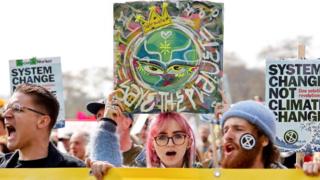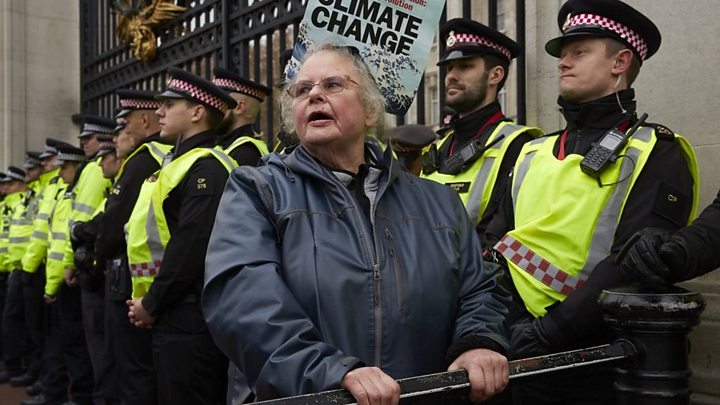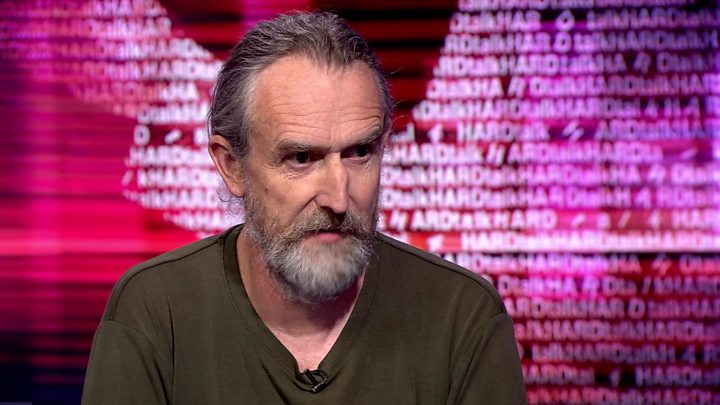Who are Extinction Rebellion and what do they want?
Extinction Rebellion is planning to start a two-week protest from Monday. …

 Image copyright Getty Images
Image copyright Getty Images Environmental campaign group Extinction Rebellion says it will start a two-week protest on Monday.
In London, it aims to “peacefully occupy the centres of power and shut them down” and protests are also planned in world cities, including Berlin, New York and Sydney.
But who are Extinction Rebellion’s supporters and what are they hoping to achieve?
What is Extinction Rebellion?
Extinction Rebellion (XR for short) wants governments to declare a “climate and ecological emergency” and take immediate action to address climate change.
It describes itself as an international “non-violent civil disobedience activist movement”.
Extinction Rebellion was launched in 2018 and organisers say it now has groups willing to take action in dozens of countries.
The group uses an hourglass inside a circle as its logo, to represent time running out for many species.
Getty
2025group’s aims for zero carbon emissions
298,000followers on Facebook
1,130people arrested over April’s London protests
2018year the group was founded
Source: BBC Research
Are its aims realistic?
In the UK, Extinction Rebellion has three main demands:
- The government must declare a climate “emergency”
- The UK must legally commit to reducing carbon emissions to net zero by 2025
- A citizens’ assembly must be formed to “oversee the changes”
Reducing CO2 emissions to almost zero in six years’ time would be extremely ambitious.
Severe restrictions on flying would be needed. Diets would have to change, by drastically cutting back on meat and dairy. And there would have to be a massive increase in renewable energy, along with many other radical changes.

Media playback is unsupported on your device
But those involved with Extinction Rebellion say the future of the planet depends on it. “We have left it so late that we have to step up in a semi-miraculous way to deal with this situation,” said co-founder Gail Bradbrook.
However, the group doesn’t say what the solutions to tackle climate change should be. Instead, it wants the government to create a “citizens’ assembly”, made up of randomly selected people representing a cross-section of society. Its members would decide how to solve the climate crisis, with advice from experts.
What are its tactics?
In April 2019, Extinction Rebellion held a large demonstration in London. Over the course of 11 days, some of the city’s busiest routes were brought to a standstill.
The action resulted in more than 1,100 arrests – most on suspicion of not following police instructions to move.
Some activists glued themselves to trains and to the entrance of the London Stock Exchange. Some marched on Heathrow Airport and others chained themselves up.
Internationally, Extinction Rebellion estimates an additional 400 of its activists have been arrested since 31 October 2018, including about 70 in New York City.
In June, activists blocked traffic in New York, several German protesters chained themselves outside Angela Merkel’s Chancellery in Berlin, and in Paris the police used pepper spray to clear activists blocking a bridge over the Seine.
What have critics said about them?
It is not difficult to find people who object to Extinction Rebellion’s tactics – from delayed drivers on Twitter to newspaper columnists.
Its supporters have been criticised as “environmental fanatics” who plan to ruin thousands of holidays and risk alienating thousands of potential supporters.
April’s London protests cost the police an extra £7.5m, according to Met Police Commissioner Cressida Dick.
Extinction Rebellion says anyone angered by its protests should “find out more about the severity of the ecological and climate crisis”.
It has also defended causing criminal damage, such as smashing windows. It says such tactics are sometimes necessary and that it is “super careful” not to put anyone at risk.

Media playback is unsupported on your device
Who supports Extinction Rebellion?
Young people are most likely to agree with its aims, a survey of 3,000 people conducted by YouGov in April suggests.
Among 18- to 24-year-olds, 47% either “strongly supported” or “somewhat supported” the disruption of traffic and public transport to highlight Extinction Rebellion’s aims.
Extinction Rebellion gets most support from younger adults
Adults asked if they broadly support or oppose disruptive climate protests
That compared with 36% of those aged 50-65 and 28% of over-65s.
It has also received support from public figures, such as the actress Emma Thompson, politicians Diane Abbott and Caroline Lucas and the bands Radiohead and Massive Attack.




